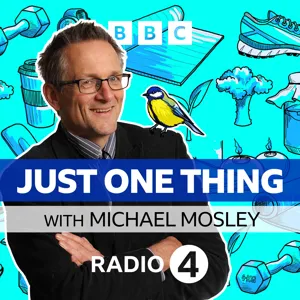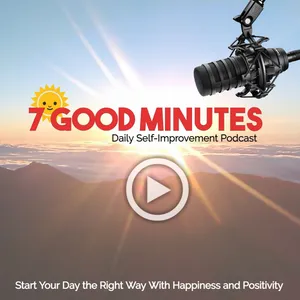Podcast Summary
LinkedIn's hidden job market and expressing gratitude: LinkedIn is a crucial platform for businesses to find passive job seekers and expressing gratitude can boost mental and physical health.
LinkedIn is a valuable resource for hiring professionals, particularly those who may not be actively looking for a new job. With over 70% of LinkedIn users not visiting other leading job sites in a given month, businesses risk missing out on potential top candidates if they don't post their job openings on LinkedIn. Additionally, expressing gratitude can have significant positive effects on mental and physical well-being. The practice of writing down things one is grateful for can lead to improved mood, lower blood pressure, and better sleep. These are just a few of the many benefits of gratitude, making it a simple yet effective way to improve one's overall health and well-being. Finally, counting blessings is not an outdated concept, but rather a scientifically backed practice with lasting effects. So whether you're looking to hire top talent or improve your own well-being, consider giving these practices a try.
Expressing gratitude can lead to increased happiness, better sleep, less physical illness, and less pain: Regularly practicing gratitude can improve emotional and physical well-being, leading to increased happiness, better sleep, less illness, and less pain.
Expressing gratitude can have a positive impact on both our emotional and physical well-being. Research from the USA, specifically studies involving college students and patients with neuromuscular diseases, have shown that regularly practicing gratitude can lead to increased happiness, better sleep, less physical illness, and even less pain. This is believed to be due to increased activation in the medial prefrontal cortex, the area of the brain associated with decision making and social reward. However, it's important to note that not all research produces glowingly positive results and if you have serious mental health concerns, it's important to speak with a healthcare professional. For those who tend to focus on the negative aspects of life, practicing gratitude may be a helpful way to shift perspective. Nathan, who was struggling to find time for gratitude journaling, plans to start in the morning to make it a consistent habit. Doctor Fuchsia Sirui, a researcher at the University of Sheffield, has conducted research on gratitude and its role in health and well-being, particularly for those living with chronic health conditions. She explained that asking people to think about three things they're grateful for each day, often triggered by kind actions of others, can be an effective way to cultivate gratitude.
Expressing gratitude boosts positivity and improves health: Gratitude puts us in a positive state, broadens perspective, reduces negative thoughts, leads to better sleep, pain relief, improved health behaviors, reduces stress, and positively impacts the immune system
Expressing gratitude, whether it's for a moment or as a dispositional tendency, can have positive effects on both mental and physical well-being. According to the research, expressing gratitude puts us in a more positive state, broadens our perspective, and helps us focus on the positive, reducing negative thoughts and feelings. This can lead to better sleep, pain relief, and improved health behaviors. Additionally, expressing gratitude may reduce stress levels, which can positively impact the immune system. Overall, gratitude acts as a coping mechanism and a mood regulator, bringing various benefits to our health and well-being. While the exact mechanisms are still being researched, the evidence suggests that expressing gratitude can lead to improved mental and physical health.
Gratefulness and Healthy Behaviors: People with a grateful mindset are more likely to engage in healthy behaviors, such as getting enough sleep, eating well, exercising regularly, and managing stress, due to their stronger future orientation and the brain's overlap of gratitude and future thinking areas.
Cultivating a grateful mindset not only broadens our perspective but also encourages healthier behaviors. A study involving 5,000 people across 17 different samples revealed that those with a more grateful mindset were more likely to engage in healthy behaviors, such as getting enough sleep, eating well, exercising regularly, and managing stress. This connection may be due to the fact that grateful individuals tend to have a stronger future orientation, making them more likely to consider the health benefits of their actions. Neuroscience research also supports this link, as the areas of the brain associated with gratitude overlap with those involved in future thinking. Thus, gratitude may serve as a powerful motivator for individuals to prioritize their long-term health and well-being.
Practicing Gratitude Boosts Mental and Physical Wellbeing: Regularly practicing gratitude through journaling or other means can enhance mood, improve heart health, sleep, and lower blood pressure.
Practicing gratitude, whether through journaling or other means, can have significant positive impacts on both our mental and physical wellbeing. Nathan, who has been incorporating gratitude journaling into his daily routine, shared his positive experience and the noticeable shift in his thought process towards the positive. Dan also mentioned the mood-enhancing effects and potential long-term benefits for heart health, sleep, and lower blood pressure. Moreover, activities like inversion therapy, meditation, and even simple acts of gift-giving can contribute to overall happiness and wellbeing. By making these practices part of our daily lives, we can reap the rewards and improve our overall quality of life.
Affordable high-quality travel essentials from Quinn's: Quinn's offers stylish and functional travel essentials at up to 80% off similar brands while ensuring safe and ethical manufacturing practices
Quinn's offers high-quality jet setting essentials at affordable prices. From European linen to premium luggage and buttery soft Italian leather bags, Quinn's has it all. And the best part? These items are priced at 50 to 80% less than similar brands. But it's not just about the savings. Quinn's also prioritizes safe and ethical manufacturing practices, ensuring that the factories they work with meet their high standards. So, not only can you pack your bags with stylish and functional essentials, but you can do so with peace of mind. Whether you're planning a vacation now or saving up for one in the future, Quint.com is the place to go for affordable yet high-quality travel essentials. Plus, with free shipping and 365-day returns, there's no risk in trying out their products. So why wait? Go to quint.com/pack and start packing for your next adventure today.






